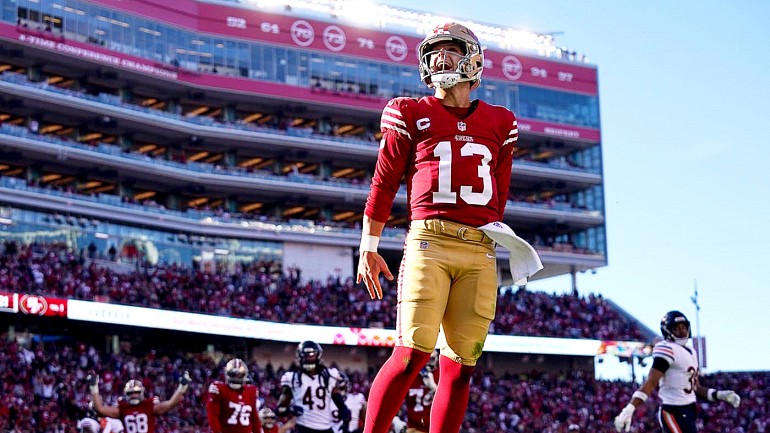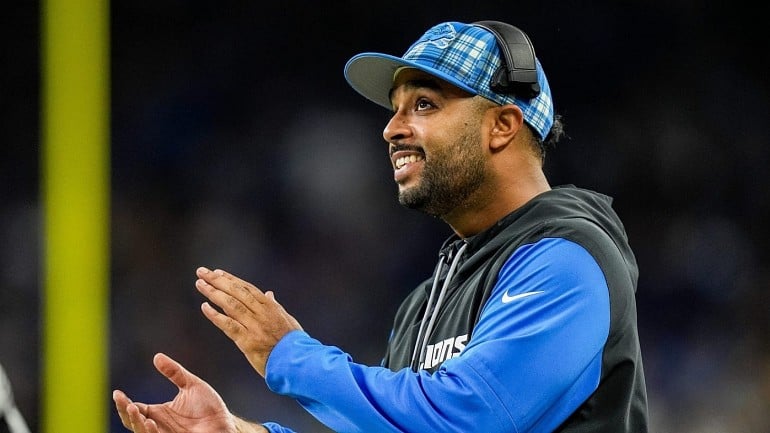When Jed York announced that Jim Harbaugh was not going to continue his tenure as the head coach of the 49ers, he announced that the team was primarily searching for a new head coach who had the same characteristics as a teacher. While fans, pundits, and scribes alike have weighed in on the virtues of Jim Tomsula as Harbaugh's successor, often discussing whether he will be or should be retained for a second season, it would stand to reason that the best measure of his success in performing the job that was expected of him by his owner would be his performance at the tasks that are expected of a teacher. In the interest of simplicity, the work of a teacher has been categorized into three general tasks: instruction, planning, and grading. I'll do my best to evaluate Jim Tomsula and his staff in each of these tasks.
INSTRUCTION:
Without lingering too long on defining this topic, teachers are expected to instruct students on how to perform certain tasks, and why they must be performed in that manner. Students are shown how a skill should be performed as they hear the instructions, and are then asked to perform the task while receiving feedback. Mastery of the task requires that the student can perform the task correctly without guidance, and can self-diagnose and correct deficiencies.
Here is where Jim Tomsula excels, and this is what I believe Jed York was thinking about when he made his "teacher" statement, likely with Tomsula in mind. While Tomsula was the defensive line coach, the team could depend on steady production from mid and late round picks, as well as undrafted free agents. Tomsula used an effective combination of his eye for detail, specific technical expectations, and down-to-earth delivery to ensure that everyone in his position group mastered their position well enough to perform their responsibilities within the defense, regardless of their perceived talent or draft slot.
Matthew Emmons-USA TODAY Sports
That characteristic has carried on to the 2015 team. Young players that have been forced into significant roles have performed surprisingly well. Rookies or second year players who had their rookie years lost or cut short due to injury have stepped into important roles and acquitted themselves well, which indicates that Tomsula and his staff have done a good job of getting those young players up to speed without much time or opportunity for growth and reflection. Kenneth Acker, Jimmie Ward, Arik Armstead, Jaquiski Tartt, Andrew Tiller, Trent Brown, Blake Bell, and Shaun Draughn have all performed well with their opportunities this season. None of them were key contributors to the team last year, either because of injuries or because they weren't on the roster. Unfortunately, some of these young players who have been performing so well have only done so in small sample sizes because their opportunities were limited. How could they be stuck at the bottom of the depth chart if they were already prepared to succeed? That is a fair question that must be addressed when discussing…
GRADING:
While instruction is the task most commonly associated with teaching, grading is the most arduous, most thankless, and often most difficult portion of the job. Teachers must remain coldly impartial when assessing student performance, and they must show brutal honesty to favorites and glowing praise to agitants, as the black-and-white (unless you are in art class) student work dictates.
This appears to be a failing point of Tomsula and his staff. One of the perceived benefits of hiring Tomsula for the 49ers job was his familiarity with the roster. Rather than spending an entire season getting to know strengths, weaknesses, and tendencies of each player, it was anticipated that this staff would have an advantage in making lineup changes as necessary, because they would already know what players had to offer the team, from the top of the roster to the bottom. Discovering midseason that Vernon Davis was not the best tight end on the roster allowed the team to get a late round pick for a player the team was going to lose at the end of the season; however, had they figured out the tight end depth chart sooner, they could have dealt Davis during training camp and received better compensation. Replacing Jordan Devey with Andrew Tiller was weeks overdue, an error that was compounded by the knowledge that Tiller was originally cut before the season started and stuck on the practice squad. Trenton Brown clearly outplayed Erik Pears against Cincinnati, but he only entered the game because of an injury to backup left guard Marcus Martin. Gerald Hodges has generally outplayed Michael Wilhoite, but it took an injury to Wilhoite to put Hodges onto the field. The coaches could not find cause to keep Joe Looney (now a productive starter for the Titans), even thought the interior of the line has struggled all season.
Kirby Lee-USA TODAY Sports
There has been a clear preference toward veteran players who consistently know where to be on the field, even when those players have demonstrated an inability to actually perform their job at their point of responsibility. The fear of mental errors by younger, more physically capable players has prevented this staff from allowing those younger players from getting the very experience that they need to fine tune technique and prevent further mental lapses. Knowing where to be 100% of the time means very little when a player can only get there and do their job correctly 50-60% of the time. Knowing where to be 80% of the time and being physically capable of performing the assigned task correctly 80% of the time allows for an overall success rate of 64%, with obvious room for improvement. One could make a compelling argument that the inability to get the best players on the field all season has been the most significant contributing factor to this lost season. A counter-argument could easily be made that the parade of losses should be blamed on an inability of the coaching staff to put these players in the best positions to succeed when they are on the field, which would rely heavily upon…
PLANNING:
In order for a teacher to ensure student success, they must be assured that the skills they are imparting to the students are vital to their success during the current and subsequent scholastic years. Wasting time by teaching unnecessary skills prevents adequate teaching time for skills that will be vital to current and continued understanding of concepts. Teaching skills out of sequence can be more confusing than instructive, and teaching skills out of context can make those skills seem so abstract that a student will fail to access those skills when they are needed. Teachers must constantly assess their students' mastery of the concepts that they are currently tasked with learning, as moving on from a concept that is not completely comprehended to a new concept can jeopardize the ability of the student to properly understand and employ both the current concept and the new concept that is being introduced prematurely.
As a coach, planning involves selecting plays, protections, route schemes, pressure packages, run fits, and coverages that negate strengths and exploit weaknesses that have been noted in the film of the current opponent. Those points of emphasis receive significant preparatory time during the practice week, as the team looks to utilize those specific concepts to their advantage during the majority of the game. Failing to properly identify weaknesses in the opponent will make it more difficult to scheme for that opponent. Misunderstanding which concepts should properly exploit the weaknesses presented by an opposing team will waste limited practice and preparation time, while presenting new weaknesses for the opponent to exploit.
This defensive staff has failed mightily at planning. Mangini overloaded the defense with too many concepts, resulting in busted coverages and a storm of chunk plays for opposing offenses. The defense performed better when fewer schemes were used and concepts were mastered at a manageable pace, but games were lost in bunches before that fairly obvious mistake was rectified. The failure of the defense to perform in away games points directly to deficiencies in planning for games outside of Santa Clara. The defense leads the league in points allowed at home, indicating that there is significant talent on the defensive roster to stop opposing offenses. Levi's Stadium does not provide a home field advantage that would account for the ~15 points per game discrepancy.
Offensively, the team has struggled in the first quarter all season, indicating that the initial game plan may have been a poor fit for the opponent in every week of the season. While the improved production of the offense later in each game may indicate successful in-game adjustments, this is not a team that can afford to be ineffective on offense at the beginning of every game. It is inexcusable to lean heavily upon deep sideline throws against a team like Seattle, since the Seahawks (specifically CB Richard Sherman and safeties Earl Thomas and Kam Chancellor) defend deep sideline throws better than any team in the league. The Seahawks' suffocating pass rush can force quarterbacks to rush those throws or attempt those throws off of their back foot, affecting accuracy and timing to the point that the likelihood of costly turnovers outweighs the potential for accumulating yards in chunks. It is ridiculous to not use routes that feature lateral misdirection against a team that has repeatedly been exposed for difficulty in changing directions. Failing to stress long-striding CBs like Richard Sherman with multiple horizontal breaks by quicker receivers. Successful offenses have sustained drives against the Seahawks by exploiting this weakness, and it is appalling that the 49ers apparently were unable to either diagnose or scheme to exploit this flaw in a team they should be familiar with. Knowing that the offensive line has struggled to protect either starting quarterback should lead an offensive staff to pick up yards creatively on first and second downs, so that the offense does not have to throw predictable, long-developing pass plays on third down. Instead, the 49ers offense finds itself perpetually in third-and-long scenarios, due to predictable first down play calling.
OVERALL GRADE:
Without grading curves or extra credit, it looks like this staff is heading to summer school. Regardless of Jim Tomsula's popularity in the locker room and within the front office, one point out of three possible is always going to be 33.3%, and that's good for an F- in any school. Jim Tomsula is not succeeding at the task that was identified as the most vital component of a successful 49ers coach: be a teacher.




